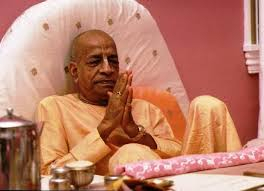Aug 10 1976 Tehran
Prabhupāda: Law given by the state, that is law. If you create a law at home, that is not law. Dharma means what is ordained by Kṛṣṇa, God, that is dharma. And other things, that may be temporary. You can create some laws within your family, but that is not generally applicable to others. But when it is given by the government, that is real law. That is applicable to all people. When you go out to the street, you have to abide by the laws of the state, the light. As soon as there is red light, you have to stop. At home you may not make such rules and regulations. But that is within your home, that is not general. Similarly, sarva-dharmān parityajya [Bg. 18.66] means what you have made at your home, concoction, give up all these dharmas. Here is the real dharma, mām ekaṁ śaraṇaṁ vraja. That is dharma. Everyone has to surrender to Kṛṣṇa or God. So that is real dharma.…..
Atreya Ṛṣi: So we can fall as far as we want.
Prabhupāda: Fall or rise also. Why do you say fall? You can rise to the highest platform from the fallen condition. That is Kṛṣṇa consciousness movement. That you are in a fallen condition, come to the highest platform and talk with God, play with God, dance with God. That is our opportunity. Now it is up to you to take it or not to take it. That is up to you. But our propaganda is this, tyaktvā dehaṁ punar janma naiti mām eti kaunteya [Bg. 4.9]. You simply try to understand Kṛṣṇa. Then janma karma ca me divyam evaṁ yo vetti tattvataḥ tyaktvā deham [Bg. 4.9]—this is our propaganda. We are trying to induce people to understand Kṛṣṇa. Then his life is successful.But if you don’t try to understand, that is your business. But we are offering that here is a movement, you try to understand Kṛṣṇa. What is the wrong there? But if you don’t like, who can force you? We are going country to country, door to door, town to town. What is our business? We are simply requesting that “You try to understand Kṛṣṇa.” And Kṛṣṇa says, “As soon as you understand Me, you come to Me.” Tyaktvā dehaṁ punar janma naiti mām eti [Bg. 4.9]. Now it is up to you. If you take theoretically, that “If by understanding Kṛṣṇa I can go to the eternal, blissful spiritual life,” why not try it? And if you inquire that, “All right, it is very good proposal. By going back to Kṛṣṇa, everything is solved. Yes, I’ll go. So what is the method?” Then if I say, “Chant Hare Kṛṣṇa,” where is the difficulty? Why you are so much determined not to do anything to go back to home, back to Godhead? That is your misfortune. If it is so easy, and it is the means of solving all the problems, why not try it? “All right, let me try in this life.” Why don’t you do it? It is not a very difficult task. If you don’t do it, then you are misfortunate. Therefore Caitanya, kono bhāgyavan jīva. This is the process to be adopted by the some fortunate persons. But they do not want to become fortunate. They want to remain unfortunate. That is the difficulty.…..
Mr. Sharma: When one person surrenders to God, to Lord Kṛṣṇa, so does māyā automatically vāṇīsh?
Prabhupāda: Yes. Kṛṣṇa says…Mr. Sharma: If I say, I pray to God, “O Lord Kṛṣṇa, I surrender unto You.” So is…, māyā will not touch me? I will not be affected by this material infection?
Prabhupāda: Yes. If you fully surrender, māyā will not touch you.
Mr. Sharma: How one surrenders? What is meaning of surrender?
Prabhupāda: Surrender as He says, sarva-dharmān… You have nothing to do. You have simply to do what Kṛṣṇa says. That is surrender. You cannot reserve anything, that “I do it something for me and something for Kṛṣṇa.” That is not surrender. You have nothing to do except what Kṛṣṇa says. That is surrender.
Mr. Sharma: If that is surrender, means I now surrender.
Prabhupāda: Otherwise, it’s not surrender.
Mr. Sharma: Only saying is not surrender?
Prabhupāda: You have to act, become active.
Mr. Sharma: So one who has surrendered, what is his thinking and acting, how he lives in the world?
Prabhupāda: He’s active only on Kṛṣṇa’s business. That’s all. He has no other business.
Mr. Sharma: So he does no other work. He does only what Kṛṣṇa has said.
Prabhupāda: Yes.
Mr. Sharma: Preaching and this and that.
Prabhupāda: Yes, just like we are doing. Kṛṣṇa said, “Surrender unto Me.” And what we are preaching? We are preaching, “Sir, you surrender to Kṛṣṇa.” So what is the difficulty? Is there any difficulty? Kṛṣṇa said “Surrender unto Me.” And if I go to you “Mr. Sharma, you surrender to Kṛṣṇa.” So what is my difficulty?
Mr. Sharma: Suppose I want to surrender to God, to Kṛṣṇa. How I will do it?
Prabhupāda: No, no, first of all my position, because I am working on behalf of Kṛṣṇa. So Kṛṣṇa says, “You surrender unto Me.” So if I say that “Sir, you surrender to Kṛṣṇa,” so where is my difficulty?
Mr. Sharma: You see, yes, I say I surrender to Kṛṣṇa.
Prabhupāda: You surrender, not surrender, that is you business. But my business is that I am requesting you that you surrender to Kṛṣṇa. So where is my difficulty? You surrender, not, that is your business. But my business is to canvass, “Sir, you surrender to Kṛṣṇa.” So I am representing. And Kṛṣṇa says, na ca tasmān manuṣyeṣu kaścin me priya-kṛttamaḥ [Bg. 18.69]. I have to be recognized by Kṛṣṇa. That is my business. So if I do agree, then I become recognized by Kṛṣṇa. You do or not do, that is your business. My only business is to request you.
Mr. Sharma: That I should surrender.
Prabhupāda: Yes. But if you accept it, it is good for you; you don’t accept it, that is your misfortune. But my business is finished.
Mr. Sharma: So fortune comes very much into it.
Prabhupāda: Fortune you create. Man is the architect of his own fortune. If you don’t accept Kṛṣṇa’s advice, then unfortunate. But my business is not difficult. We are simply going door to door and asking, “Sir, you become a devotee of Kṛṣṇa.” If he is inquisitive, “How can I become?” “You chant Hare Kṛṣṇa.” So where is my difficulty? Haven’t got to pay you something. I simply carry the message of Kṛṣṇa. And Kṛṣṇa says na ca tasmān manuṣyeṣu kaścin me priya [Bg. 18.69]. “He’s My most beloved person, who does this.”So why shall I give up this simple job and become recognized by Kṛṣṇa? It is very simple thing. That is the advice of Caitanya Mahāprabhu. Caitanya Mahāprabhu says āmāra ājñāya guru hañā tāra’ ei deśa [Cc. Madhya 7.128]. “All of you become guru and deliver these persons where you live.” So how can I become guru? I have no education, I have no knowledge. No, no. You haven’t got to-yāre dekha, tāre kaha ‘kṛṣṇa’-upadeśa [Cc. Madhya 7.128]. “You go and simply instruct him what Kṛṣṇa has said, you become guru.” So Kṛṣṇa has said, “Surrender unto Me,” I say “You surrender to Kṛṣṇa,” I become guru. Even though I am a fool number one, I become guru, because I am repeating what Kṛṣṇa has said. That’s all. I don’t require any education. Very simple thing. Everyone can become guru if he simply repeats what Kṛṣṇa has said, that’s all.
Mrs. Sahani: So it seems that to surrender to Kṛṣṇa, the first thing…
Prabhupāda: Unless he surrenders, how he can say others to surrender? Unless one has fully surrendered, if he says to others, “You surrender,” that has no meaning. He must have surrendered. Then he can say to others, “You surrender.” Unless he has surrendered, how he can take up this business, go door to door and say, “You surrender to Kṛṣṇa, you surrender to Kṛṣṇa”? That means he has surrendered. He has no other business. And what I am doing? I am doing the same thing. I have not given any bribe to these Europeans, Americans, or the anyone. No bribe, no show of gold manufacture. I simply say this, “You just become devotee of Kṛṣṇa.” That’s all.
Mrs. Sahani: Chanting Kṛṣṇa’s name is very essential.
Prabhupāda: Yes, that is the easiest way. By chanting Kṛṣṇa, you are associating with Kṛṣṇa. Because Kṛṣṇa is absolute, so Kṛṣṇa and Kṛṣṇa’s name, no difference. Kṛṣṇa, Kṛṣṇa’s name, Kṛṣṇa’s form, Kṛṣṇa’s quality, everything, absolute. So chanting of Kṛṣṇa’s name means you are associating with Kṛṣṇa. So if you are associating with Kṛṣṇa, then gradually you become Kṛṣṇa-ite.
Mrs. Sahani: Creates the desire to get knowledge.
Prabhupāda: Yes. Ceto-darpaṇa-mārjanam [Cc. Antya 20.12]. Caitanya Mahāprabhu has recommended, paraṁ vijāyate śrī-kṛṣṇa-saṅkīrtanam, ceto-darpaṇa-mārjanam. Just like if you remain in touch with the fire, certainly you become warm. So if you remain always in touch with Kṛṣṇa, then you become Kṛṣṇized. Very easy. You haven’t gone to the forest or Himalaya or meditate. Simply chant Hare Kṛṣṇa. That is recommended in the śāstra: harer nāma harer nāma harer nāmaiva kevalam, kalau nāsty eva nāsty eva nāsty eva [Cc. Ādi 17.21]. You cannot perform any severe austerities, penance. Wherever you remain, you chant Hare Kṛṣṇa. And you become perfect. If not in one day… But you will become, if you continue chanting.And where is the difficulty? Where is the loss? And if there is some gain, why don’t you try it? That is intelligence. I am not losing anything by chanting Hare Kṛṣṇa. If there is any gain, why not chant? Huh? Why is the argument not to chant? There is no loss, but if there is any profit, why don’t you try to take it. Śāstra recommends. Kṛṣṇa recommends, satataṁ kīrtayanto māṁ yatantaś ca dṛḍha-vratāḥ [Bg. 9.14].
Note-Srila Prabhupada mentions above that one become guru-how? Simply repeat what Caitanya Mahaprabhu preached. Remain at home, preach to all your friends, family, and associates and then you become “guru”. Siksa guru-instructing guru, not initiating guru because for that one must be on the top most platform of God /Krsna Consciousness
Madhya 7.130–At whosoever’s house Śrī Caitanya accepted His alms by taking prasāda, He would convert the dwellers to His saṅkīrtana movement and advise them just as He advised the brāhmaṇa named Kūrma
PURPORT–The cult of Śrī Caitanya Mahāprabhu is explained here very nicely. One who surrenders to Him and is ready to follow Him with heart and soul does not need to change his location. Nor is it necessary for one to change status. One may remain a householder, a medical practitioner, an engineer or whatever. It doesn’t matter. One only has to follow the instruction of Śrī Caitanya Mahāprabhu, chant the Hare Kṛṣṇa mahā-mantra and instruct relatives and friends in the teachings of the Bhagavad-gītā and Śrīmad-Bhāgavatam. One has to learn humility and meekness at home, following the instructions of Śrī Caitanya Mahāprabhu, and in that way one’s life will be spiritually successful. One should not try to be an artificially advanced devotee, thinking, “I am a first-class devotee.” Such thinking should be avoided. It is best not to accept any disciples. One has to become purified at home by chanting the Hare Kṛṣṇa mahā-mantra and preaching the principles enunciated by Śrī Caitanya Mahāprabhu. Thus one can become a spiritual master and be freed from the contamination of material life.There are many sahajiyās who decry the activities of the six Gosvāmīs-Śrīla Rūpa, Sanātana, Raghunātha dāsa, Bhaṭṭa Raghunātha, Jīva and Gopāla Bhaṭṭa Gosvāmīs-who are the personal associates of Śrī Caitanya Mahāprabhu and who enlightened society by writing books on devotional service. Similarly, Narottama dāsa Ṭhākura and other great ācāryas like Madhvācārya, Rāmānujācārya and others accepted many thousands of disciples to induce them to render devotional service. However, there is a class of sahajiyās who think that these activities are opposed to the principles of devotional service. Indeed, they consider such activities simply another phase of materialism. Thus opposing the principles of Śrī Caitanya Mahāprabhu, they commit offenses at His lotus feet. They should better consider His instructions and, instead of seeking to be considered humble and meek, should refrain from criticizing the followers of Śrī Caitanya Mahāprabhu who engage in preaching. To protect His preachers, Śrī Caitanya Mahāprabhu has given much clear advice in these verses of Śrī Caitanya-caritāmṛta.



